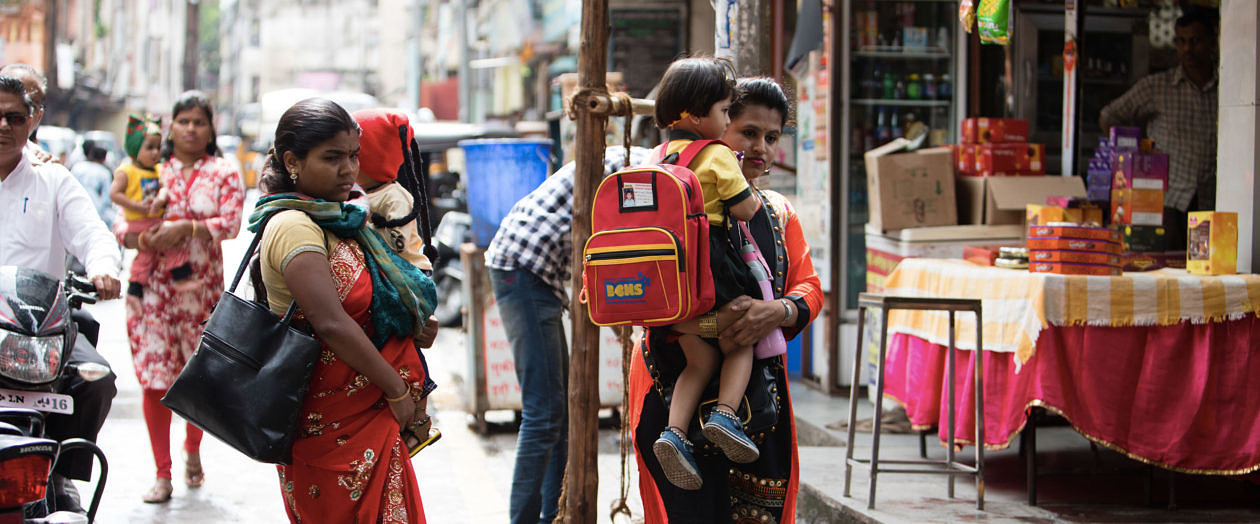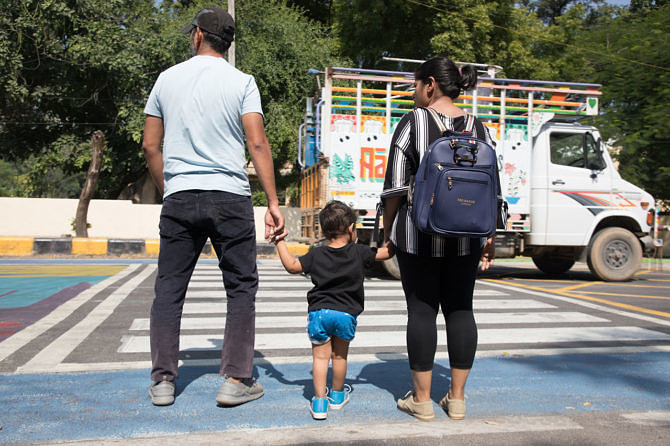Anchoring a focus on the early years in national urban policies
Anchoring a focus on the early years in national urban policies and guidelines sets the frame for action at scale

Zoom in Details
Mainstreaming early childhood development principles in the pack of technical documents to planners is a first step towards large scale implementation.
- Government Agencies Engaged:
- Education, Health, Housing, Parks and Gardens, Transportation, Urban Development
- Implementing Agency:
- Smart Cities Mission, Ministry of Housing and Urban Affairs, Government of India
- Funding Source:
- Bernard van Leer Foundation
- Scale:
- The guidelines focus on the neighbourhood scale, and are applicable across the smart cities network in India.
- Area:
- Urban95
- Implementation action in focus:
- Scale
- Location:
- India
- Reach:
- Member cities of India’s 100 Smart Cities
- Share:
- Print:
Summary of Intervention/Programme
The Bernard van Leer Foundation supported the production of a pack of five documents around the notion of the Infant, Toddler and Caregiver Neighbourhood (ITCN). The pack includes a policy framework, design guidelines, a policy workbook, a guide on evaluation and monitoring metrics, and a best practice compendium.
The pack is disseminated to the smart cities through the Ministry of Housing and Urban Development’s online platform, and will be used to train practitioners across India on implementation of the infant, toddler and caregiver neighbourhoods, starting with two Urban95 cities: Pune and Udaipur. The pack is meant to be used for new neighbourhood-level urban developments, as well as redevelopments of existing urban areas.
The documents were produced via a collaboration involving Bernard van Leer Foundation teams from India and the headquarters, the international urban planning and design firm BDP, an Urban95 grantee and technical expert from Tirana, Albania, another city of the Urban95 network. This work also drew insights from neighbourhood intervention concepts tested in two cities in Recife, Brazil and Bogotá, Colombia and adapted it to the Indian context. It was peer reviewed by top technical experts from around the world.

What worked well
Urban95 peer network
The production of the Infant, Toddler and Caregiver neighbourhood (ITCN) guidance brought together various teams involved in Urban95, from within and outside the Bernard van Leer Foundation. Most importantly, the concepts were adapted from Urban95 experiments in Bogotá, Colombia and Recife, Brazil on area-based interventions, and benefitted from the work of an Urban95 technical partner from a non-governmental organisation in Tirana, whose director has been developing a similar concept for Tirana too. This Urban95 peer network was facilitated by the BvLF teams in India and at the global headquarters in the Netherlands, and allowed for the documents to be produced at record speed in a few months.
Area-based approach
One small intervention may not have a visible impact on child development or family wellbeing, but a series of several interventions, coordinated in time, concentrated in a specific neighbourhood, and supporting each other can have a multiplied effect. We have learned that the neighbourhood level is the optimal scale for area-based interventions related to the early-years, due to the specific needs and constraints that shape how caregivers interact with the city. Focusing on a series of coordinated intervention in the area also allows to integrate different agendas in the community, building support and ownership.
Setting the frame
The publication of this set of guidance on Infant, Toddler and Caregiver Neighbourhood at the national level is instrumental in achieving large scale impact. This allows the principles to spread top-down towards the city and their technical staff. The idea is that after initial implementation, the guidance will be updated based on the experience on the ground. In order for such top-down approach to be successfully implemented and influence child development outcomes, training sessions are needed in order to build the capacity and awareness of frontline practitioners in relation to the documents.
What didn't work well
Applying the ITCN guidance across the pioneering cities of Pune and Udaipur as well as training other smart cities to incorporate the framework is still a work in progress. The Bernard van Leer Foundation, the Smart Cities Mission and their partners will learn more as they progress. The ITCN guidance would also need revision from time to time based on insights from the cities’ experience in putting the guidance into practice.
The guidance itself is not enough for cities to enthusiastically take up the cause of building or retrofitting existing neighbourhoods so that they work for young children and their families. There is a constant need to build capacity of the cities, provide incentives for implementation, and encourage cities to enshrine the guidance or aspects of it into policy.